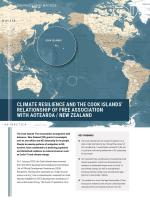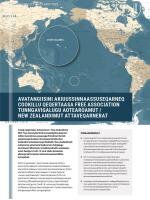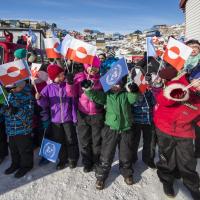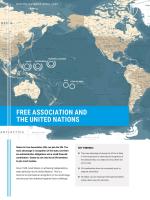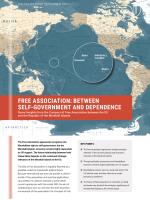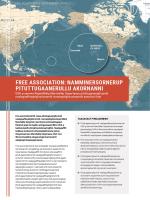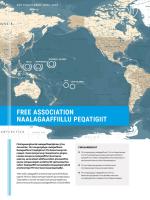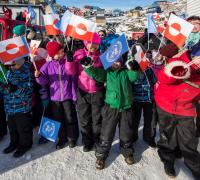Climate resilience and Cook Islands' relationship of Free Association with Aotearoa / New Zealand
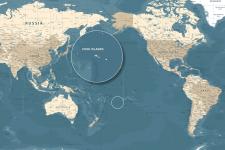
Read in Greenlandic (translation: Tukummeq Maliina Møller-Steffens)
On 1 January 2020, the Cook Islands was removed from the OECD Development Assistance Committee’s List of Official Development Assistance (ODA) Recipients. Having been assessed as a “high-income status country”, this re-classification rendered the Cook Islands ineligible for OECD development assistance. It was unfortunate timing. The Covid-19 pandemic hit a few months later and caused a significant contraction in the tourism sector on which the Cook Islands is economically dependent. The result was, by the government’s own description, a “severe recession” with a total contraction of -21.6% of GDP in 2020/ 2021. Thus, only months after being recognized as having a sufficiently high income as to no longer warrant OECD development-assistance, the Cook Islands lost nearly a quarter of its GDP.
- The Cook Islands has not sought recognition as a state under international law through the pursuit of UN membership. It would likely succeed if it did, but it could also risk losing entitlement to NZ citizenship for its people.
- NZ citizenship has contributed to the declining Cook Islands population, which has diminished local resilience to existential threats such as Covid-19 and climate change, as well as strengthened individual climate resilience by providing the legal basis for cross-border mobility.
- It is unclear how much the legal relationship of Free Association matters to the amount of development assistance the Cook Islands receives from NZ.
This was especially significant for a country that is particularly susceptible to climate change and weather-related hazards. The Cook Islands is made up of 15 coral atolls and volcanic islands. Over 90% of the residents of the 12 inhabited islands live within one kilometer of a coastline. In addition, its already modest population of just under 15,000 people is rapidly decreasing (down from approximately 17,500 in 2016), undermining social and economic resilience to shocks. Despite notable economic growth in the years preceding Covid-19, greater infrastructure and other investment remains essential to brace the country for future climate-related changes. A question thus arises as to the benefits of Free Association in circumstances where the former colony faces crises.
Cook Islands’ Model of Free Association
When it was agreed in 1965, the Cook Islands’ model of Free Association with NZ fell into a legal grey zone. Not quite a state, and no longer a colony, Free Association granted the island nation the benefits of independent governance and aspects of statehood while also retaining important connections with NZ. There is no precise rulebook for the form Free Association must take, but it is characterized by a high degree of independence for the former colony such that it would qualify for statehood, and it must be the result of the voluntary and informed choice of the peoples of the territory concerned. Distinct from the alternatives—full independence or integration into the colonizer state—Free Association was a hybrid mechanism. It was designed to facilitate decolonization as required under the UN Charter in a way that would enable the progressive, rather than instantaneous, transferral of governmental responsibilities. For the Cook Islands and NZ, there were numerous practicalities to iron out, including citizenship, military service, exports and imports, housing, healthcare, unions and agriculture.
In 1960, the UN General Assembly set forth three options for decolonisation: independence as a sovereign independent State, integration with another independent State, and Free Association with an independent State. Only five former colonies have opted for Free Association and each has a bespoke relationship with a former colonial power.
The Cook Islands / NZ relationship of Free Association is not based on what would be recognized as a treaty under international law. Rather, it rests on the Cook Islands Constitution Act 1964 (NZ), the appended Cook Islands Constitution, various formal assurances made by the NZ leadership, and the obligations of NZ under the UN Charter. Under the arrangement, the NZ government has no authority to enact or amend law in the Cook Islands. The exercise by NZ of certain responsibilities for defence and foreign affairs does not grant NZ any right to control those matters for the Cook Islands. Rather, NZ acts as its agent. The Cook Islands has legal competence to enter into international relations in its own right, not simply through the agency of NZ.
Statehood and citizenship
Today, the Cook Islands is viewed by some as a state under international law and by others as a self-governing territory within the Realm of NZ. It is not a UN member state, which is a key indicator, though not a prerequisite, of statehood. If and when the Cook Islands seeks UN membership, its status as a state under international law would be undoubtable, and the arrangement of Free Association with NZ would probably end. In practical terms, it is doubtful that an application for UN membership would be a surprise to NZ. It is highly likely to be agreed in advance between the two countries.
Under the arrangement, the NZ government has no authority to enact or amend law in the Cook Islands. The exercise by NZ of certain responsibilities for defence and foreign affairs does not grant NZ any right to control those matters for the Cook Islands.
For some years, NZ governments on both sides of politics have indicated that if the Cook Islands obtained UN membership, it would be expected to adopt its own system of citizenship. However, in a December 2022 media interview, the NZ Foreign Minister intimated an opposite view, namely that citizenship could be retained by Cook Islanders, even after the Cook Islands joined the UN as a state. That view is not contained in official government policy, however, and its implementation would depend on the results of the October 2023 election. If the NZ government was to swing right, as expected, and the Cook Islands sought UN membership, it is possible that a new conservative government would hold tight to previous interpretations and repeal the provisions of the NZ Citizenship Act 1977 that apply its terms to the Cook Islands.
Loss of NZ citizenship would constitute a significant change. Emigration to NZ is a common strategy for coping with external stressors, as evidenced by patterns of historical outward mobility and the surge in departures during Covid-19. It is notable too that there are substantially more Cook Islanders living in NZ than in the Cook Islands. In the 2018 NZ census, approximately 80,000 people claimed to be Cook Islander or of Cook Islands descent. On the other hand, even if access to NZ citizenship were withdrawn, it would not preclude Cook Islands people from emigrating to NZ, for example through family reunification, pre-existing special visa categories for people from the Pacific Islands, or perhaps a new arrangement. That is, transition to statehood and the subsequent removal of NZ citizenship as of right could slow outward migration from the Cook Islands to NZ, but it would not halt it.
Free Association and Financial Assistance
It is difficult to gauge how much the legal status of the Cook Islands as Freely Associated influences the amount of NZ development assistance it receives. After the economic shocks to the Cook Islands in 2020, NZ almost doubled its planned 2021-2024 development funding from NZD$75 million to NZD$147 million (1 NZ$ = 0,63 USD). No other Pacific territory received a proportionately similar increase in assistance at the time. Yet, it is doubtful whether the legal relationship of Free Association was pivotal here. The Cook Islands was uniquely at risk, and the later 2021 announcement of additional funding to the Cook Islands was a joint package of NZD$100 million to both Fiji and the Cook Islands; one an independent state, the other a Freely Associated territorial entity. NZ’s Pacific Development Cooperation budget includes all 15 Pacific Island territorial entities, each of which will receive planned development assistance from NZ in the tens to low-hundreds of millions over 2021-2024. The attainment of statehood would not remove the Cook Islands from this list.
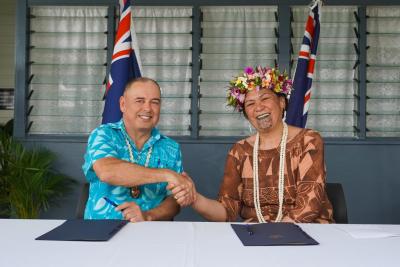
Importantly, the Cook Islands and NZ share a sense of connectedness in terms of cultures, languages and values. The Cook Islands was, like NZ, colonized by the British, and it is widely thought that the Māori who arrived in NZ centuries before colonization came from, or through, the Cook Islands. In NZ, tikanga Māori principles are increasingly applied alongside otherwise predominantly common law legal philosophies. NZ’s approach to the Cook Islands relationship reflects that system of legal pluralism.
The “whakapapa” ties—shared histories, ancestral, cultural and language connections—between the two countries are important in terms of the feeling of connectedness between NZ and the Cook Islands, recognition of which is entrenched in relevant NZ policy. This includes, for example, the Ministry of Foreign Affairs and Trade’s four year plan for the Cook Islands (2021-2024) (this Ministry has responsibility for overseeing all of NZ’s free association arrangements), the 2022 Cook Islands Statement of Partnership (a political commitment to mutual respect for principles of prosperity, well-being, security and environment post-pandemic), as well as its broader Pacific policies.
